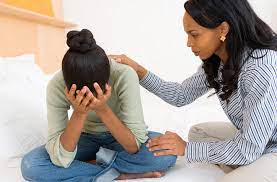Depression is a serious issue that should not be taken lightly. It can lead to suicide in some cases, so it is important to know the signs and symptoms of depression in teenagers. If you think your teen might be depressed, it is important to get them to help right away. In this blog post, we will discuss the 10 most common signs of depression in teens. We will also provide tips on how to help your teen if they are struggling with depression.
Contents
Defining Depression In Teens
 Depression in teens looks different than depression in adults. For example, irritability is a more common symptom of depression in adolescents than sadness. These days, depression is such a common issue that one in every five adolescents will suffer from it at some point during their teenage years.
Depression in teens looks different than depression in adults. For example, irritability is a more common symptom of depression in adolescents than sadness. These days, depression is such a common issue that one in every five adolescents will suffer from it at some point during their teenage years.
The prevalence of depression in teens is often attributed to the many changes they experience during this time. Their bodies are growing and changing, they’re dealing with new emotions. And they’re navigating social interactions in a whole new way. All of these things can be overwhelming, which is why it’s important to be aware of the signs of depression in teenagers.
According to studies, depression affects approximately 11% of adolescents in the United States. While girls are more likely to experience depression, boys are more likely to suffer from substance abuse. Or engage in risky behaviors as a way of coping with their depression.
So, what are the signs of depression in teens? Let’s discuss the top 10 signs to look for!
10 Signs Of Depression In Teens
The signs of depression in teens are often very different from adults. Here are 11 signs to watch for in your teen.
Withdrawal From Activities
Your teen used to love going to soccer practice or hanging out with friends, but now they seem disinterested in anything. They may stop participating in activities that they once enjoyed. More often, they will withdraw from social activities altogether. In fact, they may start to isolate themselves completely, because they feel like they just can’t connect with anyone.
For instance, they may forego hanging out with friends in person. And instead, spend all their time alone in their room playing video games or on the internet. This will eventually lead to them feeling even more isolated and alone.
Changes in Mood
You may notice that your teen’s mood changes drastically and without explanation. They may be more irritable, anxious, or have a shorter temper than usual. They may also seem hopeless, sad, or numb. If you notice any of these changes lasting more than two weeks, it may be time to talk to your teen about depression. Moreover, if your teen’s mood changes are interfering with their ability to function at home, school, or work, this is also a sign that something more may be going on.
Loss of Interest
 Loss of interest during the depression in teens can look like apathy, boredom, or disinterest in activities they typically enjoy. If you notice your teen is no longer interested in the things that make them happy, it may be a sign of depression. Moreover, if your teen withdraws from friends and social activities, it may be another sign that something is wrong.
Loss of interest during the depression in teens can look like apathy, boredom, or disinterest in activities they typically enjoy. If you notice your teen is no longer interested in the things that make them happy, it may be a sign of depression. Moreover, if your teen withdraws from friends and social activities, it may be another sign that something is wrong.
However, there are times when loss of interest may not be so obvious. For example, some depressed teens may continue to participate in activities. But do so without enjoyment. If you notice your teen going through the motions of their hobbies or interests without any enthusiasm. Then, it could be a sign too that they’re struggling.
Lethargy and Fatigue
Fatigue and lethargy are two more common signs of depression in teens. If your teen is struggling to get out of bed in the morning or seems exhausted all the time, it could be a sign that something is wrong. Of course, every teenager feels tired sometimes. But if this fatigue is persistent and interferes with your teen’s ability to function normally, it’s worth taking a closer look.
In fact, sometimes fatigue is one of the first signs that something is wrong. If your teen used to be full of energy and now they can barely get through the day, it’s a red flag. Moreover, lethargy should not be an approach to life. If your teen is making every effort to avoid activities, it could be a sign of depression.
Persistent Sadness or Irritability
Sadness and irritability are two of the most common signs of depression in teens. If your teen seems persistently sad or irritated, it could be a sign that they are struggling with depression. This is often a situation where it can be helpful to talk to a doctor or therapist, as they can help your teen understand and manage their feelings.
However, your teen may also be dealing with normal teenage moodiness. So, it’s important to look for other signs of depression before assuming that your teen is depressed.
Difficulty Concentrating in School
 Depression in teens can be hard to spot. Your teen may suddenly have difficulty concentrating in school or their grades may start to slip. If you notice a change in your teen’s school performance. Take the time to talk to them about it and ask if anything is wrong. It could be a sign of depression.
Depression in teens can be hard to spot. Your teen may suddenly have difficulty concentrating in school or their grades may start to slip. If you notice a change in your teen’s school performance. Take the time to talk to them about it and ask if anything is wrong. It could be a sign of depression.
Moreover, concentration in school can also be difficult for depressed teens. Because they may start to see everything in their life as pointless. School can feel like a waste of time if your teen is feeling hopeless or helpless. For example, a teen who used to love going to school may start skipping classes or coming home early. Then, it is a sign to pay attention to.
Changes in Eating And Sleeping Habits
This type of change is usually characterized by a loss or gain in appetite and can result in your teen becoming either too thin or overweight. If you notice that your teen’s eating habits have changed, it could be a sign of depression. For example, they may skip meals, eat more junk food than usual, or binge eat.
Also, sleeping patterns may change. Depression can cause insomnia, which is when a person has difficulty falling asleep or staying asleep. Or, your teen may start sleeping more than usual and have trouble getting out of bed in the morning. If you’re noticing changes in your teen’s eating or sleeping habits. Then it is important to take some further action.
Moreover, changes in eating habits can also be physical manifestations of depression. For instance, your teen may have trouble sleeping, which can lead to fatigue and a loss of interest in food. Or, they may be so anxious that they can’t eat or have no appetite at all.
Feeling Exhausted All Time
Exhaustion is one of the most common symptoms of depression. If your teen is complaining about being tired all the time, they may be depressed. This is so because they avoid activities that would make them feel better and eventually leads to fatigue. If your teen is exhausted, it’s important to have them see a doctor rule out any physical causes of their exhaustion.
However, if they are cleared physically, then it’s important to explore the possibility of depression. This symptom is often accompanied by a lack of motivation, which is another sign of depression.
Aches and Pains
 Another common symptom of depression is aches and pains. This can manifest in headaches, stomachaches, and general pain all over the body. It’s often hard to pinpoint the source of these aches and pains, and they can persist even after treatment for depression.
Another common symptom of depression is aches and pains. This can manifest in headaches, stomachaches, and general pain all over the body. It’s often hard to pinpoint the source of these aches and pains, and they can persist even after treatment for depression.
Aches and pain signs of depression in teens might be chalked up to laziness or hormones. But if your teen is complaining of more aches and pains than usual, it could be a sign that something else is going on.
Frequent Complaints
It is the rare teen who is never moody or irritable, but you should pay attention if your child’s negative attitude lasts for more than a couple of weeks and starts to interfere with school, friendships, and other activities. If your teen is frequently complaining of physical problems.
Moreover, if your teen’s unhappiness seems to be accompanied by various changes. Then, you should be aware of the possibility of depression.
So, these are some signs that may help you notice if your teen is depressed. If you think your teen might be depressed, don’t hesitate to talk to him or her about it and look for professional help.
Warning Signs to Look For

There are some common warning signs that may indicate your teen is struggling with depression and need immediate help. So, if you notice any of the following signs, it’s important to reach out to a professional for help:
- Talking gradually about committing suicide
- Saying things like: “I wish I was dead” or “I feel like life is not worth living”
- Expressing a desire to hurt or kill themselves
- Giving away prized possessions
- Withdrawing from friends and family completely
- Seeking out ways to end their life, such as stockpiling pills or looking up methods online
- Extreme mood swings and irritability.
So, these are some common warning signs to look for if you think your teen might be depressed. If you notice any of these signs, it’s important to reach out to a professional for help. Because these behaviors can be a sign that your teen is in danger and needs immediate help.
If you are worried about your teen, the best thing to do is talk to them about it. Ask them how they’re feeling. And if they want to talk about what’s going on. Let them know that you are there for them. Also, there are some things you can do to support your teen. Let’s discuss those tips below!
Tip To Help Your Teens
When you recognize the signs of depression in teens, it’s important to get them help. Here are some tips on how you can provide support:
Talk to them about their feelings
If you are worried about your teen, talk to them about what is going on. Encourage them to express how they are feeling. Let them know that it is okay to feel this way and that you are there for them. Moreover, you can also ask their friends or family members if they have noticed any changes in your teen’s behavior. In this way, you can get a better sense of what is going on and how to best help your teen.
Listen to them
 When you finally encourage them to share their feeling, make sure to listen to them. Do not try to fix their problems or offer advice. Just be there for them and let them know that you support them. This can go a long way in helping your teen feel better. In fact, teens with depression are more likely to seek help if they feel that their parents are supportive.
When you finally encourage them to share their feeling, make sure to listen to them. Do not try to fix their problems or offer advice. Just be there for them and let them know that you support them. This can go a long way in helping your teen feel better. In fact, teens with depression are more likely to seek help if they feel that their parents are supportive.
Encourage positive activities
One of the best things you can do for your teen is to encourage positive activities. This can help take their mind off of their negative thoughts and help them focus on something more positive. Activities can include things like:
- writing a poem or story
- hobbies
- spending time with friends and family
- spend some time in nature
These are positive and healthy activities that can help your teen feel better.
Meditation and Mindfulness
These two tools are very effective in quieting the mind and can help to prevent depression. Meditation techniques are always a good idea to learn, but it is essential for people who are prone to depression. Mindfulness helps us to be more present and can prevent us from dwelling on negative thoughts. Some examples are:
- eating mindfully
- being aware of your surroundings
- noticing the good things that happen during the day
- practicing gratitude.
In fact, there are several types of meditation and mindfulness practices, so you can find one that suits your teen best.
Encourage Social Interaction
One of the best things you can do for a teen suffering from depression is to encourage social interaction. This may seem counterintuitive, but spending time with friends and family can actually help alleviate some of the symptoms. It’s important to find activities that your teen enjoys and that make them feel good.
Also, you have to combat social isolation by modeling social interaction yourself. Be sure to set aside time each week to spend with your teen, even if it’s just watching a movie or going out to eat. This will send the message that you care about them and want to spend time with them.
Set Some Boundaries
 Boundaries are essential for both you and your teen. By setting boundaries, you are showing your teen that you care about their wellbeing. It also shows them that you are willing to help them through their depression. Some things you can do to set boundaries include:
Boundaries are essential for both you and your teen. By setting boundaries, you are showing your teen that you care about their wellbeing. It also shows them that you are willing to help them through their depression. Some things you can do to set boundaries include:
- Make sure they are getting enough sleep.
- Encourage them to eat healthy meals.
- Limit their screen time.
- Make sure they are getting some exercise every day.
- Encourage them to spend time with friends and family.
These are just a few ideas, but the most important thing is to be consistent with your boundaries. Teens need structure and consistency when they are dealing with depression.
Identify if They Need Professional Help
There are times when you teen’s sadness, irritability, or withdrawal from activities lasts for more than two weeks. And is severe enough to interfere with school, friendships, or family life. This may be a sign that they need professional help.
Professional help can come in the form of therapy or medication. If your teen is severely depressed, they may need to be hospitalized for a short time to make sure they are safe. Usually, therapy and medication can help treat depression. So seek help if they need it. You can contact Mantra Care for help in finding a mental health professional in your area. It is also a great resource for information on depression and other mental health issues.
Therefore, these are some things you can do to help your teen if they are depressed. But, remember that you cannot force them to get help. They have to want it in order for treatment to be successful.
Conclusion
To conclude, signs of depression in teens can be difficult to spot. As a parent, you know your teen better than anyone, so if you are concerned about their mental health, don’t hesitate to reach out to a professional for help. If you think your teen is in danger of harming themselves, please seek emergency medical help immediately.
Moreover, while the above signs are indicative of depression, it’s important to remember that only a licensed professional can give a formal diagnosis. If you’re worried about your teen, the best thing you can do is talk to them openly. And honestly about your concerns and encourage them to seek help from a therapist or counselor. Soon, with the proper help, your teen will be on their way to feeling better.
For more information, please contact MantraCare. Depression is a mental illness characterized by persistent feelings of sadness, hopelessness, and loss of interest in daily activities. If you have any queries regarding Online Depression Counseling experienced therapists at MantraCare can help: Book a trial Depression Therapy session


